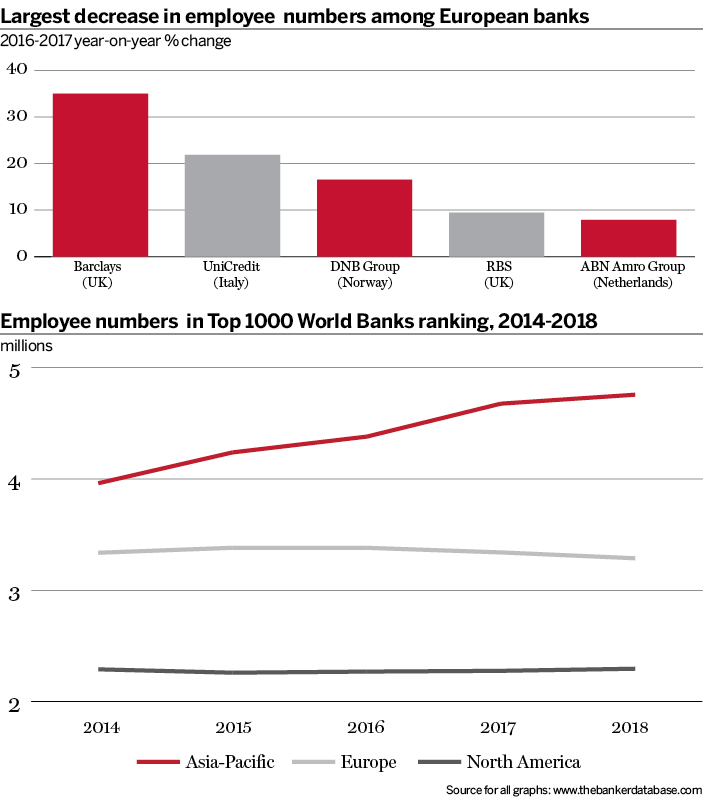The staffing levels at European banks continue on a downward trend, with Barclays, UniCredit and DNB Group leading the charge. Joy Macknight reports.
The European banking industry continues to shed jobs as the region’s banks work on improving their profitability and efficiency. This is a trend that is expected to accelerate as banks further advance their digitalisation strategies.
The region cut almost 1.5% of the financial workforce over the past five years, with a net loss of more than 50,000 jobs, according to data compiled by The Banker Database.
In North America, bank staffing levels increased slightly, with just 0.2% growth. Asia-Pacific, on the other hand, continues to expand its workforce – with a 14.4% rise in staff numbers – as the region builds out its branch networks and the banking markets continue to mature in many countries.
Axe falls in East...
The central and eastern European banking industry has seen the greatest contraction in employment, with a 12.9% drop over the past five years, mainly due to rising staff costs and consolidation in many markets. Latin America also experienced a 7.3% drop in employee numbers.
In 2017, Barclays saw the largest percentage fall in headcount (35%) of the top 30 banks in Europe (as ranked in The Banker’s 2018 Top 1000 World Banks). The UK bank reduced its staff by more than 43,000. While much of this can be attributed to the bank offloading its African operations, including Egypt, Zimbabwe and Johannesburg-based Barclays Africa Group, it also due to branch closures and restructuring to comply with UK ring-fencing rules that take effect in 2019.
In addition, in February 2017, Barclays announced a revamp of its back office, as part of a wide-ranging restructuring. According to reports, by creating a new services unit Barclays aimed to consolidate functions spread across more than 10,000 roles, helping it to achieve more cost savings.
In second place is UniCredit, which cut its workforce by more than 20%, effectively shedding more than 25,000 jobs. Like Barclays, much of this can be attributed to the Italian bank selling off parts of its business, including Poland’s Bank Pekao to Powszechny Zakład Ubezpieczeń and Polish Development Fund, following an earlier sale of Ukraine’s Ukrsotsbank to Alfa-Bank.
In December 2016, UniCredit announced plans to cut 14,000 jobs throughout the next three years in a strategic overhaul of its operations. The same month it announced the sale of Pioneer Investments business to the French asset manager Amundi.
Norway’s DNB Group oversaw the third highest percentage of job losses, eliminating almost 1900 positions. The bank is well advanced in its digitisation strategy and has closed 70% of its branches over past three years. In 2017 it transferred its operations in Estonia, Latvia and Lithuania to Luminor Bank, a joint venture with Nordea.
…but West not unscathed
Unsurprisingly, Royal Bank of Scotland made it into the top five in Europe for reductions in headcount, cutting more than 7300 staff. The majority state-owned UK bank has gone through numerous restructures, slashed its branch network and, in August 2017, announced plans to axe 40% of its London IT staff and 65% of contractors to cut costs.
Dutch bank ABN Amro rounds out the top five, reducing its headcount by more than 1700, partly to save money as well as due to the move towards greater digitalisation of banking services.
Meanwhile, Spain’s CaixaBank saw the biggest increase (14.1%) in employee numbers by percentage change. The lender moved outside its home market for the first time and acquired Portugal’s Banco BPI, which added more than 4500 to its headcount.



